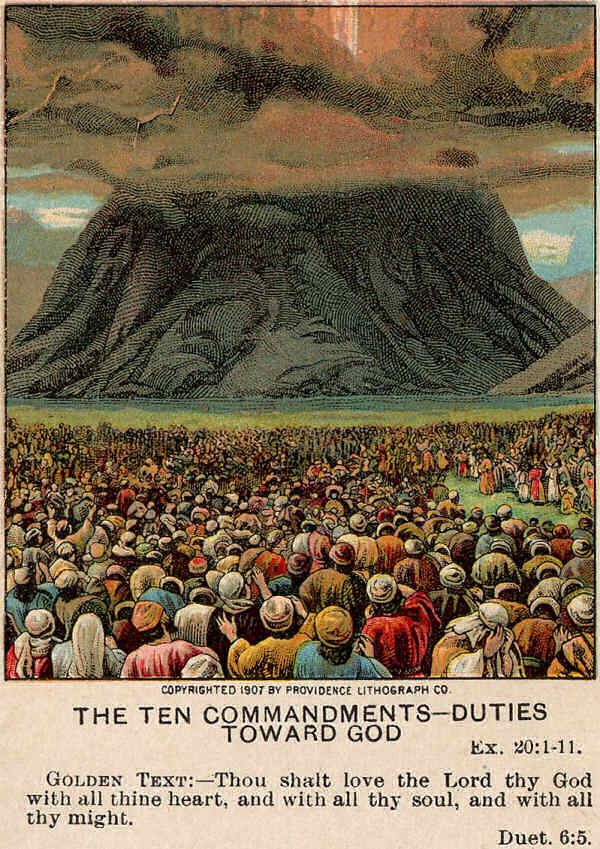+ Blue Letter Bible/KJV + 개역한글 성경구절
글 수 4
2024.6.14 02:12:29

▶ 산당/사당/높은 대 High Place.
The word commonly used for the high place is bamah, signifying what is high or elevated (cf. Ezek. 20:29), and then the hills on which altars were erected. There were such places in Canaan before the Israelites entered it, which they were told to destroy. Num. 33:52. If the Israelites had such, God would destroy them and cut down their images. Lev. 26:80.
(겔20:29 이에 내가 그들에게 이르기를 너희가 다니는 산당이 무엇이냐 하였노라 (그것을 오늘날까지 바마라 일컫느니라)
(민33:52 그 땅 거민을 너희 앞에서 다 몰아내고 그 새긴 석상과 부어 만든 우상을 다 파멸하며 산당을 다 훼파하고
(레26:8 너희 다섯이 백을 쫓고 너희 백이 만을 쫓으리니 너희 대적들이 너희 앞에서 칼에 엎드러질 것이며
In the above passages the high places are connected with idolatry; but it would appear that before the temple was built, altars for the worship of God had been erected elsewhere than at the tabernacle. With Samuel at Zuph, there was 'a sacrifice of the people' in the 'high place' (God having forsaken the tabernacle at Shiloh, this disorder resulted). It was evidently on elevated ground, for they went up to it and came down. 1 Sam. 9:12-25. At the beginning of the reign of Solomon the people sacrificed in high places because the temple was not yet built. This was failure, for we read that "Solomon loved the Lord, walking in the statutes of David his father: only he sacrificed and burnt incense in high places." 1 Kings 3:2-4. The tabernacle was there (Gibeon), 1 Chr. 16:39; 2 Chr. 1:3, so that it appeared to be the right place to go to, and it was where God appeared to Solomon in the night; yet it was 'the great high place.' The reason of this implied disapproval is doubtless because the ark was not there, the symbol of God's presence, which was the true place of worship. At the close of Solomon's life he sinned greatly in building a high place for the gods of all his strange wives. 1 Kings 11:7, 8. On the division of the kingdom, Jeroboam set up his idols and "ordained him priests for the high places, and for the devils, and for the calves which he had made." 2 Ch. 11:15. With these two examples it is not surprising that in the whole land there were many high places. Hezekiah and Josiah zealously destroyed the high places, which included the buildings thereon and the idols connected therewith. The word bamah is used apparently for any idolatrous erection, for we once read of high places in a valley. Jer. 7:31.
(삼상09:12-25 사무엘을 찾는 사울
(왕상03:2-4 2 그 때까지 여호와의 이름을 위하여 전을 아직 건축하지 아니하였으므로 백성들이 산당에서 제사하며 3 솔로몬이 여호와를 사랑하고 그 부친 다윗의 법도를 행하되 오히려 산당에서 제사하며 분향하더라 4 이에 왕이 제사하러 기브온으로 가니 거기는 산당이 큼이라 솔로몬이 그 단에 일천 번제를 드렸더니
(대상16:39 제사장 사독과 그 형제 제사장들로 기브온 산당에서 여호와의 성막 앞에 모시게 하여
(대하01:3 온 회중과 함께 기브온 산당으로 갔으니 하나님의 회막 곧 여호와의 종 모세가 광야에서 지은 것이 거기 있음이라
(왕상11:7, 8. 7 모압의 가증한 그모스를 위하여 예루살렘 앞 산에 산당을 지었고 또 암몬 자손의 가증한 몰록을 위하여 그와 같이 하였으며 8 저가 또 이족 후비들을 위하여 다 그와 같이 한지라 저희가 자기의 신들에게 분향하며 제사하였더라
(대하11:15 여로보암이 여러 산당과 수염소 우상과 자기가 만든 송아지 우상을 위하여 스스로 제사장들을 세움이라
(렘07:31 힌놈의 아들 골짜기에 도벳 사당을 건축하고 그 자녀를 불에 살랐나니 내가 명하지 아니하였고 내 마음에 생각지도 아니한 일이니라
The term 'high places' has another application under the Hebrew word ramah, which also signifies 'exalted;' for Israel is charged with making a high place in every street, and at every head of the way, which doubtless refers to some shrine or symbol of idolatry connected with abominable practices. Ezek. 16:24, 25, 31, 39. They courted the favour of the heathen by adopting their idolatrous worship and customs.
(겔16:24, 25, 31, 39. 24 너를 위하여 누를 건축하며 모든 거리에 높은 대를 쌓았도다 25 네가 높은 대를 모든 길머리에 쌓고 네 아름다움을 가증하게 하여 모든 지나가는 자에게 다리를 벌려 심히 행음하고 31 네가 누를 모든 길머리에 건축하며 높은 대를 모든 거리에 쌓고도 값을 싫어하니 창기 같지도 않도다 39 내가 또 너를 그들의 손에 붙이리니 그들이 네 누를 헐며 네 높은 대를 훼파하며 네 의복을 벗기고 네 장식품을 빼앗고 네 몸을 벌거벗겨 버려두며
--- Morrish Bible Dictionary
개역한글KHRV( 120일1독, 1년1독, 권별, 성경통독 )
STUDY - 구절(WESLEY), 단락(MATTHEW), 읽기(Wayne),
Dictionary - Chapter, OT구약, NT신약, 테마별,
(*.247.37.51)
|
.
성경연대표
1.창조
2.족장
3.출애굽
4.광야
5.정복
6.사사
7.통일왕국
8.분열왕국
9.포로
10.포로귀환
11.중간
12.예수
13.초대교회
14.세계선교
관련그림.지도 1.창조
2.족장
3.출애굽
4.광야
5.정복
6.사사
7.통일왕국
8.분열왕국
9.포로
10.포로귀환
11.중간
12.예수
13.초대교회 Ani
1창세기[Genesis] 2출애굽기[Exodus] 3레위기[Leviticus] 4민수기[Numbers] 5신명기[Deuteronomy] 6여호수아[Joshua] 7사사기[Judges] 8룻기[Ruth] 9사무엘상[I Samuel] 10사무엘하[II Samuel] 11열왕기상[I Kings] 12열왕기하[II Kings] 13역대상[I Chronicles] 14역대하[II Chronicles] 15에스라[Ezra] 16느헤미아[Nehemiah] 17에스더[Esther] 18욥기[Job] 19시편[Psalms] 20잠언[Proverbs] 21전도서[Ecclesiastes] 22아가[Song of Solomon] 23이사야[Isaiah] 24예레미야[Jeremiah] 5예레미아애가[Lamentations] 26에스겔[Ezekiel] 27다니엘[Daniel] 28호세아[Hosea] 29요엘[Joel] 30아모스[Amos] 31오바댜[Obadiah] 32요나[Jonah] 33미가[Micah] 34나훔[Nahum] 35하박국[Habakkuk] 36스바냐[Zephaniah] 37학개[Haggai] 38스가랴[Zechariah] 39말라기[Malachi] 40마태복음[Matthew] 41마가복음[Mark] 42누가복음[Luke] 43요한복음[John] 44사도행전[Acts] 45로마서[Romans] 46고린도전서[I Corinthians] 47고린도후서[II Corinthians] 48갈라디아서[Galatians] 49에베소서[Ephesians] 50빌립보서[Philippians] 51골로새서[Colossians] 52데살로니가전서[I Thessalonian] 53데살로니가후서[2 Thessalonian] 54디모데전서[I Timothy] 55디모데후서[II Timothy] 56디도서[Titus] 57빌레몬서[Philemon] 58히브리서[Hebrews] 59야고보서[James] 60베드로전서[I Peter] 61베드로후서[II Peter] 62요한일서[I John] 63요한이서[II John] 64요한삼서[III John] 65유다서[Jude] 66요한계시록[Revelation]

 , 성경권별
, 성경권별 

